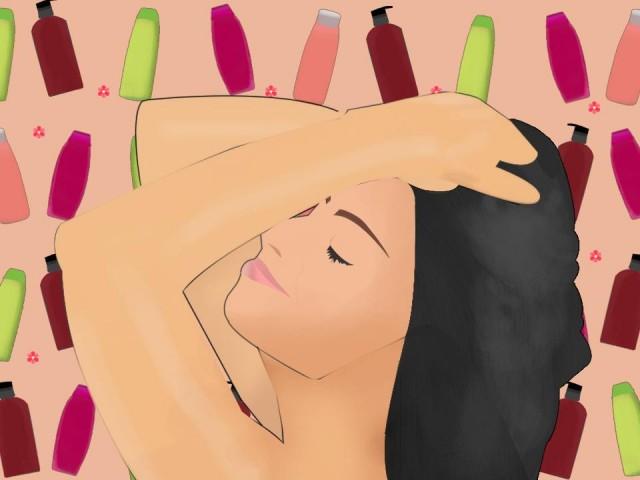Is shampooing every day bad for my hair?
You’ve probably been tipped before: Shampoo your hair every other day because doing so on a daily basis will strip the scalp of its natural oils.
But experts say, it's not that simple. While it’s true that the natural oils are needed to moisturize the scalp, the number of times you shampoo in a week differs from person to person.
The tropical climate of the Philippines is a major factor as to the reason on why most Filipinos must lather up every day, unlike our counterparts who live in cooler countries.
Dr. Theresa Tan Pascual, a dermatologist from the Medical City in Ortigas, says, “In a tropical country like ours, the humidity and sweat make our scalp oilier. The sweat can smell bad because of bacteria that produce smell.
Dr Pascual also notes the production of oil decreases as we get older. "So there are no clear-cut rules regarding how many times we should shampoo our hair. Shampooing our hair with mild shampoo and conditioner every other day should suffice, unless you perspire a lot, have oily hair, or are using anti-dandruff shampoo.”

Dr. Kahlyl Anne Sanchez Guevarra, an Aesthetic Dermatologist and Age Management Specialist with Skin + Dermaesthetics, agrees. “Shampoo as often as necessary, but once every two to three days is okay. Those with oily hair and dandruff need to wash daily, and those with the latter need to use medicated shampoo that contains Ketoconazole, Selenium sulfide, and Zinc pyrithione. Active individuals should shampoo their hair every after work out or heavy activitiy.
Christine Li, a partner at Lifestyle Salon in BGC, agrees with Dr. Pascual and Dr. Guevarra. “When you live in a place with winter or cooler climates, those are the times when the scalp tends to produce less natural oils. We need our natural oils to protect our hair and scalp, and to keep them moisturized to prevent them from drying. Those with oily hair should shampoo every day, the rest of the hair types can shampoo every other day.”
Lourd Ramos, celebrity hair stylist with Creations Salon and Lourd High Chair, recommends shampooing daily. “We work and sweat everyday, meaning free radicals are out there and our hair and scalp catch those. Bacteria can build up in our hair and scalp, and if we don’t shampoo, it can create more complications, like an oily or dandruff-irritated scalp.”
He’s a firm believer of the “rinse, lather, and repeat” mantra, stating that it’s best to shampoo twice before going to work, and once before sleeping. “Use moisturizing shampoo in the morning, and a cleansing shampoo at night, like keratin smooth by TRESemmé. Also, avoid using water that’s too hot when shampooing, to maintain the pH balance of both your hair and scalp.”
Dr. Pascual suggests this shampooing routine to try, “To avoid drying the hair, it's better to use a good conditioner at the ends of the hair, and the shampoo to be concentrated on the scalp. Condition the hair strands, not the scalp.”
READ: 5 things you can do to achieve clear, pimple-free skin
It’s easy to forget that your scalp is skin, but when you think of the usual things that happen to a person’s skin—dryness, oiliness, dullness, sweat, among other things—it sounds a lot like what happens on person’s face or body. Shampoos promise not just healthy hair, but whatever you aspire your hair to look like—from salon straight hair to bouncy curls.
When reaching for a shampoo bottle to purchase, Dr. Guevarra says to read the label and not get any products with the following: Sulfates, Isopropyl alcohol, Propylene glycol, Parabens, and Formaldehyde. These chemicals and substances are harmful and/or drying.
Says Dr. Pascual, “the ideal shampoo would have these ingredients: Panethenol, Biotin, and aloe vera.” Panethenol is a substance commonly found in skin care that turns into a vitamin when you use it, while Biotin is better known as Vitamin H, which helps your hair stay healthy, too.
“When it comes to what should be avoided in shampoos, it really depends on what you’re allergic to. Check with a dermatologist.”
READ: What causes adult acne?
Lourd thinks that organic shampoos work better, saying "Yes, though it’s both healthy and expensive, due to the natural ingredients that work its magic on both hair and the scalp. The Davines line from Italy is a good example of that.”
Christine agrees with Lourd, saying that going organic is a nice choice, especially if you have a sensitive scalp. “It actually depends on the needs of your scalp and hair, but generally it has been proven that organic shampoo is one of the safest products to use when it comes to hair care.”
The verdict? Instead of switching your hair care routine just because the internet said so, get the hair care that you need to achieve healthy hair and scalp — and the shampoo and conditioner routine to match. — LA, GMA News

Need a wellness break? Sign up for The Boost!
Stay up-to-date with the latest health and wellness reads.
Please enter a valid email address
Your email is safe with us





